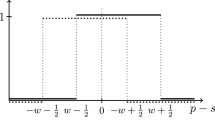Abstract
This essay investigates the relationship between congressional committees, information, and gatekeeping power. It shows that the power to obstruct legislation increases the amount of information transmitted by committees in equilibrium. As a consequence, rational floor actors will make it somewhat difficult, but not impossible, to discharge committees. Some committees will have effective gatekeeping power under the optimal rule, while others will not. The only committees that will be discharged are those which cannot credibly transmit any information to the parent body.
Similar content being viewed by others
References
Austen-Smith, D. (1990). Information transmission in debate. American Journal of Political Science 34: 124-152.
Austen-Smith, D. (1992). Information and influence: Lobbying for agendas and votes.-Manuscript: University of Rochester.
Bach, S. and Smith, S. (1988). Managing uncertainty in the House of Representatives: Adaptation and innovation in special rules. Washington DC: Brookings.
Baron, D. and Ferejohn, J. (1989). Bargaining in legislatures. American Political Science Review 89: 1181-1206.
Berman, D. (1962). A bill becomes a law. New York: MacMillan.
Cooper, J. (1970). The origins of the standing committees and the development of the modern House. Houston: Rice University Studies.
Cox, G. and McCubbins, M. (1993). Legislative Leviathan: Party government in the House. Berkeley: University of California Press.
Crawford, V. and Sobel, J. (1982) Strategic information transmission.Econometrica 50: 1431-1451.
Denzau, A and Mackay, R. (1983). Gatekeeping and monopoly power of committees: An analysis of sincere and sophisticated behavior. American Journal of Political Science 27: 740-761.
Froman, L. (1967). The Congressional process: Strategies, rules, and procedures. Boston: Little, Brown.
Gilligan, T. and Krehbiel, K (1987). Collective decision-making and standing committees: An informational rationale for restrictive amendment procedures. Journal of Law, Economics and Organization 3: 287-335.
Gilligan, T. and Krehbiel, K. (1989). Asymmetric information and legislative rules with a heterogeneous committee. American Journal of Political Science 33: 459-490.
Gilligan, T. and Krehbiel, K. (1990). Organization of informative committees by a rational legislature. American Journal of Political Science 34: 531-564.
Krehbiel, K (1987). Why are congressional committees powerful? American Political Science Review 81: 929-935.
Krehbiel, K (1988). Spatial models of legislative choice. Legislative Studies Quarterly 8: 259-319.
Krehbiel, K (1990). Are congressional committees composed of preference outliers? American Political Science Review 84: 149-163.
Krehbiel, K. (1991). Information and legislative organization. Ann Arbor: University of Michigan Press.
Matthews, S. (1989). Veto threats: Rhetoric in a bargaining game. Quarterly Journal of Economics 104: 347-369.
Mayhew, D. (1974). Congress: The electoral connection. New Haven: Yale University Press.
Oleszek, W. (1984). Congressional procedures and the policy process. Washington DC: Congressional Quarterly Press.
Orfield, G. (1975). Congressional power: Congress and social change. New York: Harcourt, Brace & Jovanovich.
Ripley, R. (1983). Congress: Process and policy. New York: W.W. Norton.
Robinson J. (1963). The House rules committee. Indianapolis: Bobbs Merrill.
Shepsle, K and Weingast, B. (1987a). The institutional foundations of committee power. American Political Science Review 81: 85-104.
Shepsle, K and Weingast, B. (1987b).Why are congressional committees powerful? American Political Science Review 81: 935-945.
Weingast, B. and Marshall, W. (1988). The industrial organization of congress. Journal of Political Economy 96: 132-163.
Author information
Authors and Affiliations
Rights and permissions
About this article
Cite this article
Epstein, D. An informational rationale for committee gatekeeping power. Public Choice 91, 271–299 (1997). https://doi.org/10.1023/A:1017955912840
Issue Date:
DOI: https://doi.org/10.1023/A:1017955912840




